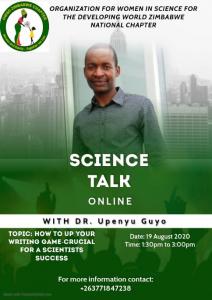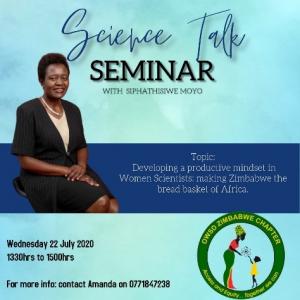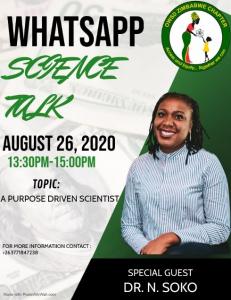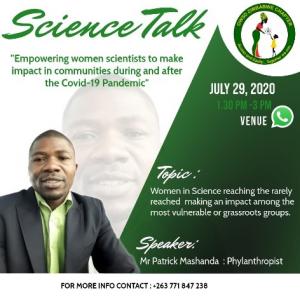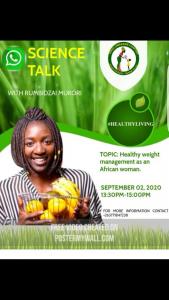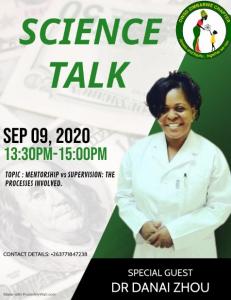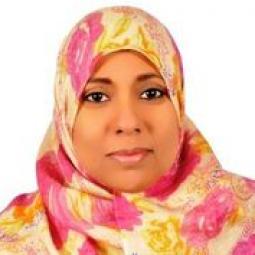How to Hold Successful WhatsApp Science Talks: A Case of OWSD Zimbabwe National Chapter
October 13, 2020
Reaching out to Women in Science : The Covid-19 pandemic affected the day to day running of the OWSDZNC . Many women had no stable internet access but we managed to reach out using WhatsApp
Mobilizing participants
In response to the COVID-19 lockdown rules and regulations, that have been in place, in Zimbabwe, since March 2020, the Organization for Women in Science for the Developing World Zimbabwe National Chapter (OWSDZNC) executive committee proposed and operationalized, weekly WhatsApp science talks. At the onset, the OWSDZNC administrator, Amanda Muza, invited members, via the OWSD-ZNC WhatsApp platform. Those interested in participating sent direct messages to her; after which she added them to a separate OWSDZNC WhatsApp online event group. After three meetings a group invite link was created and more widely, via posters, Facebook, WhatsApp and word of mouth. This enabled non-OWSDZNC members (both male and female) to join the science talks. Participants are now over 300, resulting in the formation of a second WhatsApp group, that runs concurrently with the original group, during weekly sessions.
Mobilizing speakers
The executive committee suggested a variety of topics, to be presented, so as to develop a socially and intellectually well-equipped woman scientist. The weekly WhatsApp science talks began on 20 May 2020 and the inaugural topic focused on “Sustaining Science during the COVID-19 pandemic”. The executive committee members, identified prospective speakers and the national chapter chair, Dr Fortunate Farirai liaised with identified speakers. An open call was also sent, on the OWSDZNC WhatsApp group, to get volunteer speakers, amongst members. In selection of speakers, we considered our partner organizations and also approached friends of OWSD, who are men scientists from both developing and developed world. Out of the fourteen online events held to date, five were presented by male scientists. Our WhatsApp talks were graced by the participation of the OWSD global Vice Chair, for the African region, Professor Olubukola Oluranti Babalola, who presented on the topic “Covid 19: Positive or Negative impact to female science students” on 25 August 2020.
How to help everyone participate and understand the technology
Access is a key consideration in settings where cost of technology and internet data is prohibitive. Therefore, increasing access to the online meetings was paramount. By choosing the widely available WhatsApp, the OWSDZNC tried not to leave any of its members behind. The technology has been our main means of communication, since formation of OWSD-ZNC, in November 2018. Members were therefore familiar with the technology, and needed no further training. Additionally, the executive committee approached a local telecommunications company to negotiate for members to purchase affordable data, which was being offered as part of their social corporate responsibility, during the COVID-19 pandemic. Those OWSDZNC members who opted in, were able to access data at subsidized rates, from June to July 2020. The facility was, however, discontinued in August 2020 to prioritize school pupils and university students. The executive committee is still soliciting for other opportunities to get subsidized data, to enable continued participation by all members.
Engaging the participants and getting timely feedback
When the WhatsApp science talks began, the OWSDZNC did not actively seek the participants’ feedback. However, participants would voluntarily give feedback on the WhatsApp platform either by direct messaging the administrator or sending comments to the WhatsApp group. In addition, some would give feedback to the executive committee members. It is against this background that we have formalised feedback as part of our meetings. We are also currently designing an electronic survey that will allow participants to provide concise feedback. From the various comments received so far, participants have enjoyed the WhatsApp science talks and have found them relevant and useful to various aspects of their lives. The limitation of data access and time constraints due to work commitments, were also brought up by some members.
Benefits of using WhatsApp compared to other online methods
We selected WhatsApp, for our OWSDZNC science talks because many of our members have it installed on their various mobile gadgets, it is free for use, with unlimited real time use and is user friendly. Participants can take part, while doing their normal business or household chores, from wherever they may be. There is no need to congregate in a single location or venue. Furthermore, WhatsApp is not as data-intensive as other online platforms, making it both suitable and practical, in our setting. Messaging via WhatsApp saves money by reducing text and multimedia messaging costs. The application supports messages to be shared using many formats e.g. videos, audios, word documents, PDFs, images, slideshows. Communication via instant messaging makes participants feel socially connected, in spite of the physical distance. WhatsApp permits international interactions, with participants and speakers residing in Zimbabwe, Namibia, South Africa, Australia, Europe, USA and Asia. Using WhatsApp group messaging has opened up communication and participation of regular members in OWSDZNC business. We can also receive instant feedback, by opening up discussion for all users, at the end of each session. Presentations and all conversations are also downloadable for viewing at a later date. WhatsApp offers end-to-end encryption making communication secure.
Downsides, Mistakes, Challenges and Lessons Learned
There are some downsides inherent with the use of online meetings on an instant messaging platform. The lack of physical contact may feel isolating for some members. Participants cannot opt out of one WhatsApp meeting, without completely exiting the group. Hence, some members could be disturbed by constant messages during meetings, when busy with work or other commitments. We have also learnt that comments in between the presentations tend to disrupt the flow. Participants must have internet access to participate in real time in a meeting. Participants’ profile pictures and contact numbers are visible to every person, in the group, which may breech confidentiality. Attending the live event every Wednesday has been challenging for members who are back at work. It is not always possible to know how many members are participating during a live talk, unless they contribute to the discussion. We have limited information about changes in active participation. This may be important to know, during the prevailing economic environment, caused by COVID-19. In order to rectify this, we are carrying out a survey to determine participants’ attendance and comments. We are also in the process of setting up regular surveys to be applied at the end of every meeting.
Table 1: Topics presented for the period May to September 2020
|
DATE |
PRESENTER |
TITLE OF PRESENTATION |
|
20/05/2020 |
Ms. Tofara Chokera |
Sustaining Science in the Covid 19 Pandemic |
|
27/05/2020 |
Professor Olubukola Oluranti Babalola |
Covid 19: Positive or Negative impact to female science students |
|
03/06/2020 |
Mr. Trynos Dongo |
Presentation Skills |
|
10/06/2020 |
Ms. Odiline Kava |
Personal Branding |
|
17/06/2020 |
Dr. Fidelis Chigondo |
Bridging the gap between industry and academia |
|
24/06/2020 |
Dr. Phylis Makurunje |
Outer space opportunities for girls and women in science |
|
01/07/2020 |
Dr. Tonderai Ruwa |
Personal investment for dynamic impact in STEM field |
|
08/07/2020 |
Professor Michael Daramola |
Publishing in science journals: Tips to make you succeed |
|
15/07/2020 |
Dr. Precious Mutambanengwe |
Too much "pressure" is never good "pressure"; a look at the effects of stress on our body |
|
22/07/2020 |
Ms. Siphathisiwe Moyo |
Developing a productive mindset in women scientist: Making Zimbabwe the breadbasket of Africa. |
|
29/07/2020 |
Mr. Patrick Mashanda |
Women in science reaching the rarely reached making an impact among the most vulnerable or grassroots groups |
|
05/08/2020 |
Ms. Sicelo Dube |
Response to COVID 19: My experience as a scientist |
|
12/08/2020 |
Mrs. Rumbidzai Mlambo |
Intellectual property: Crucial for Women Scientists |
|
19/08/2020 |
Dr. Upenyu Guyo |
How to up your writing game- crucial for a scientist's success |
|
26/08/2020 |
Dr Nyarai Soko |
A purpose-driven scientist |
|
02/09/2020 |
Ms Rumbidzai Mukori |
Healthy weight management in an African woman |
|
09/09/2020 |
Dr Danai Tavonga Zhou |
Mentorship vs Supervision: The processes involved |
|
16/09/2020 |
Mr Edmore Davis Jnr. Mukushwa |
Expanding STEM accessibility and uptake through open distance learning: A gendered perspective from Zimbabwe |
|
22-23 /09/2020 |
Professor Michael Daramola |
#Developing Research Proposal #Writing a Scientific Paper from Developed Proposal |

